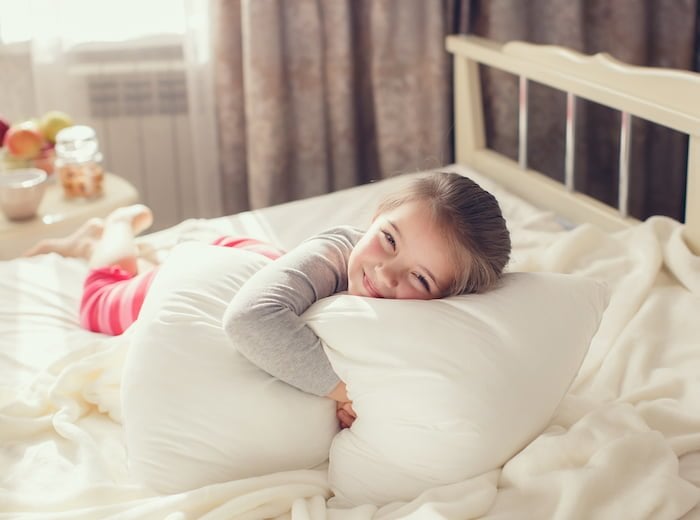7 Mindfulness Sleep Exercises for Tweens and Teens
A full day of school or busy activities can use up a lot of your child’s energy. Add in homework and extracurricular or social activities, and you can see why adequate rest is important to keep them thriving. Here are 7 mindfulness exercises to help kids sleep better.
“If you can cultivate wholesome, mental states prior to sleep and allow them to
continue right into sleep without getting distracted, then sleep itself becomes wholesome.”
~ His Holiness the Dalai Lama, Sleeping, Dreaming, and Dying
Children who maintain a regular pattern of quality sleep are generally better able to cope with life’s challenges. They tend to be less irritable, more focused, and they experience fewer behavioral outbursts.
Kids need routine in their lives to help them feel secure and untroubled. Even at the preteen stage, a nighttime routine is essential for a calm transition from the day’s busyness to a state of relaxation. As adults, we can recognize this in our own lives – trying to sleep while we are still caught up in our thoughts or smart phone does not a great night’s sleep make!
Hours of Sleep Needed by Age
While each child is different, these guidelines can help you spot if your child’s sleep schedule is on track for their age. These totals includes naps.
- 1-3 Years: 12 – 14 hours per day
- 3-6 Years: 10 – 12 hours per day
- 7-12 Years: 10 – 11 hours per day
- 12-18 Years: 8 – 10 hours per day
Just how important is sleep to your child’s ability to focus in school?
In a National Sleep Foundation experiment, children were asked to go to bed later than normal for a week, and then were asked to spend no fewer than 10 hours in bed for another week. During the week of later bedtimes, teachers rated these kids as having more academic problems and more attention problems.
Mindfulness Sleep Exercises for Kids
Make your child’s bedroom a tech-free zone and choose one or two of these seven mindfulness practices. Or try them all out and see which ones work best for your family.
Take a Warm Shower or Bath
Who says baths are just for little ones? We love a relaxing soak as adults. And tweens or teens should be encouraged to indulge in a little self care mixed with good hygiene, too. Plus, an Epsom salt bath is an effective way to detox from the chemical body burden most people carry.
Listen to a Guided Meditation
Listening to a guided meditation either via an app, a tool like the Morphee meditation player, or reading a meditation script can calm and empty the mind easily while giving them something to focus on. Guided meditation scripts for sleep or anxiety can really help at bedtime.
Write in a Journal
Simply ask your child the question, “How do you feel today?” You can write on a single sheet or you can buy a special journal for this purpose.
Allowing your child the chance to reflect on the day can help them better prepare to rest so that they can enter the new day to come regrouped and at peace. And this is one of the mindfulness exercises for teens that is super simple to work into their routine because it requires so little.
Listen to the Sounds of Nature
The calming sound of waves gently crashing is mesmerizing and brings us into the present moment to escape the racing thoughts of our busy minds.
Tools like the Morphee player also comes in a kids’ version (My Little Morphee Meditation Box) and offer meditations, sounds of nature, and calming music. It’s completely offline so there’s no worry of EMF radiation or accessing the internet during relaxing time.
Color a Mandala
Because of the circular, rhythmic, regular pattern, coloring a mandala allows our brains to calm and prepare for relaxation and sleep. This may even feel like a mindfulness exercises for your teen or tween, which can help keep the energy relaxed and free of pressure.
You can buy coloring books for bigger kids. Or print our free ones like these nature themed coloring pages or mermaid coloring sheets.
Play Calming Music
Music has a special way of touching our souls, lifting us up, and releasing emotions as well as calming our bodies and minds. Calming music before bedtime can help settle scattered minds and bring them down a few notches for calm, restful sleep.
Practice Bedtime Yoga for Tweens and Teens
Yoga is universally recognized for connecting the body, mind, and spirit, and for bringing peace and calm to our physiology. Here are 5 yoga poses to try with kids.
Other Ways to Encourage Healthy Sleep Habits for Your Child
Mindfulness sleep exercises and routines are especially helpful at bedtime. There are also other things you can do to help create good habits that encourage making good rest a priority.
- Finish homework and dinner with enough time for the family to unwind a bit before bedtime.
- Set a specific bedtime. Work backward from waking and allow for the age-appropriate number of hours your child needs to rest.
- Create a predictable bedtime routine.
Create a Healthy, Safe, Relaxing Bedroom
This article on avoiding common bedroom safety hazards covers in depth how to keep your child’s room as safe as possible. Just as you baby-proofed when they were little, do some investigating to make sure their room now isn’t a source of hidden toxins or allergens.
Be mindful of your child’s surroundings. Because your child spends so much time in their bedroom, Feng Shui experts recommend paying careful attention to the layout and contents of their room. Dedicating your child’s bedroom to quiet play, sleeping, and dreaming will help them develop healthily. Here are some simple feng shui tips for kids’ spaces.
Keep screens out of the bedroom. A Harvard Health study found that, “blue wavelengths—which are beneficial during daylight hours because they boost attention, reaction times, and mood—seem to be the most disruptive at night. The proliferation of electronics with screens, as well as energy-efficient lighting, is increasing our exposure to blue wavelengths, especially after sundown.”
Choose a nontoxic mattress. Many conventional mattresses are treated with flame retardants that can build up in the body. Another super scary factor about those mattresses is that they’re actually highly flammable. The 2-in-1 Organic Cotton Ultra Mattress from Naturepedic is not only certified organic but it’s allergen-friendly made without wool, latex, soy foam, or other potential kid allergens.
You can use the code Greenchild15 for 15% off Naturepedic’s top-rated, certified organic mattresses and accessories.
Proper sleep is essential to a healthy, growing body and brain. With these mindfulness sleep exercises, your family can all sleep more soundly.


